

Reimagining Primary and Preventive Care for a Healthier Tennessee



Reimagining Primary and Preventive Care for a Healthier Tennessee
I am proud how the Tennessee Population Health Consortium is leading efforts to realize our UT Health Science Center vision for “Healthy Tennesseans. Thriving Communities.” This vision came to us through introspection as we’ve engaged in outreach over the last two years. It’s only four words. Through collaboration with all our partners, we are striving toward our vision to provide holistic care across Tennessee.
The Consortium’s work is in lockstep with our vision, as it pursues its goal to measurably improve population health and health equity for the people of Tennessee by encouraging the adoption of innovative and evidence-based best practices to transform primary and preventive care. We have seen excellent progress in that regard, particularly through our Tennessee Heart Health Network, Neighborhood Health Hubs, and ShelbyCares initiatives. These initiatives are enabling UT Health Science Center to lead the charge in strengthening primary and preventive care across the state.
The challenge is formidable, given that our state is one of the unhealthiest in the country. 14% of our population has been diagnosed with diabetes, and we are #3 in heart attack and stroke. That puts Tennessee’s composite health ranking near the bottom: 44th among the 50 states. However, we are confident we can make improvements.
We are fortunate to have exceptional leaders, including Consortium Executive Director, Jim Bailey, and strong partnerships across the state. Together, we can accomplish remarkable feats in improving health care. Our ultimate mission is to enhance the health of Tennessee’s residents and foster flourishing communities. This remains at the forefront of our vision –ensuring the well-being of Tennesseans and creating a healthier future for all.
Thanks to our many faculty, staff, and community partners contributing to the all-important work of the Tennessee Population Health Consortium. We are grateful for all you do, and we look forward to continuing to expand the impact of this work together on the health of Tennessee.
Sincerely,
Peter Buckley, MD Chancellor
The University of Tennessee Heath Science Center
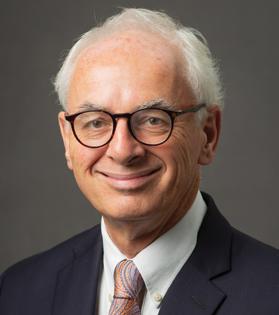
It is my pleasure to present the Tennessee Population Health Consortium 2023 Annual Report. The Consortium is working with its partner organizations to promote better health and health equity for all Tennesseans. Through our signature projects, the Tennessee Heart Health Network and the Neighborhood Health Hub Program, we are promoting evidence-based practices to transform primary and preventive care and to measurably improve health outcomes for a healthier Tennessee.
Our report offers an abundance of good news for 2023, the Consortium’s third full year of operation. We have made substantial progress toward our goal to increase investment in primary and preventive care to measurably improve population health and health equity in our state. In keeping with these goals, we opened our second health hub, ShelbyCares on 3rd, in partnership with the Shelby County Mayor’s office, and are in the process of further expanding the program. We will soon open our third neighborhood health hub, UT Health Science Center Health Hub – Soulsville, which will offer expanded services including primary care, and our first rural health hub, in Hardin County in collaboration with the UTExtension.
Some of the Consortium’s notable accomplishments in 2023 include:
• Provided over 2,700 health screening and coaching visits through our UT Health Science Center Health Hub - Uptown and ShelbyCares on 3rd locations.
• Reached more than 50,000 at-risk patients across the state through with evidence-based interventions promoted through the TN Heart Health Network and its 65 participating primary care practices across the three Grand Regions.
• Trained more than 160 lay and professional staff through our world-class online training and certification programs for Health Coaches and Community Health Workers.
• Expanded the Tennessee Population Health Data Network (TN-POPnet). The network now has clinic and hospital data for more than three million Tennesseans from 19 participating major health systems, practices, and health plans representing the entire state.
We are excited about the road ahead and invite you to join us. To support the Consortium’s work, please click on the giving link at uthsc.edu/research/populationhealth or contact Greg Harris at gharri28@uthsc.edu.
Sincerely,

Jim Bailey, MD, MPH Executive Director
TN Population Health Consortium
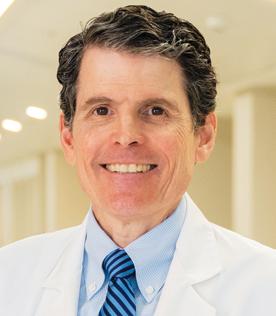
Full Health Coach Certification Program becomes available online at tnhearthealth.org/training/

The Consortium’s Distinguished Visiting Professor lecture brings to campus Scott Ramsey, MD, PhD, Director of the Hutchinson Institute for Cancer Outcomes Research at University of Washington. uthsc.edu/research/ populationhealth/newsand-events/events.php

Jim Bailey, MD, MPH, wins the UT President’s Award in the Bold and Impactful (Faculty) category, in recognition of his work as principal investigator for the TN Heart Health Network and as a champion for improving health care delivery statewide. news.uthsc.edu/threefrom-uthsc-receive-utpresidents-awards/


The Consortium begins its third year of operation. uthsc.edu/research/ populationhealth/

The Consortium and its Executive Director Jim Bailey, MD, MPH, are featured in the University of Tennessee alumni magazine. our.tennessee.edu/2023/inthe-heart-of-communities/

ShelbyCares on 3rd, operated in partnership with Shelby County Mayor Lee Harris, begins serving residents of South Memphis. shelbycares.com
Consortium Director of Measurement and Reporting Satya Surbhi, PhD, and team’s study to test medications adherence interventions for the underserved is funded. news.uthsc.edu/teamled-by-satya-surbhi-phdawarded-3-5-millionto-test-medicationadherence-interventionsfor-vulnerable-populations/

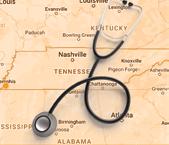
UT HEALTH SCIENCE CENTER ADAPTS POPULATION HEALTH VISION
The University of Tennessee Health Science Center adopts the vision, “Healthy Tennesseans. Thriving Communities.” for its 2023-2028 Strategic Plan, uthsc.edu/about/strategicplan/index.php
Leaders of UT Health Science Center and Shelby County government gathered with South Memphis residents for a celebration of ShelbyCares on 3rd. news.uthsc.edu/ uthsc-college-ofmedicine-shelby-countygovernment-transformhealth-care-access-withshelbycares-on-3rd/

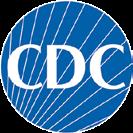
CDC FUNDS OUR HEART HEALTH WORK
A $6 million grant from the Centers for Disease Control and Prevention funding enables us to continue and expand its work to improve heart health across Tennessee for five years. news.uthsc.edu/6-millionawarded-to-jim-baileymd-and-team-at-uthsc-toexpand-tennessee-hearthealth-network/

HEALTH COACH SUSTAINABILITY CLOSER
Final guidelines for insurance reimbursement of health coach services approved by our TN-HHN Executive Council. Follows two years of work with state Medicare MCOs under BlueCare’s Cy Huffman, MD. tnhearthealth.org/ resources/reimbursement/

In 2023, Tennessee Population Health Consortium energetically pursued its mission to encourage the adoption of evidence-based practices, transform primary and preventive care, and measurably improve health outcomes, quality of life, and health equity for the people of Tennessee. Successes included more than $10 million in grant funding being awarded in 2023 to support this important work.








Serving as umbrella organization for the CDC-funded TN Heart Health Network , the Neighborhood Health Hub Program , and the Tennessee Population Health Data Network (TN-POPnet), the Consortium is a collaboration of major academic institutions, healthcare providers, and other stakeholders working to improve population health and health equity in Tennessee. It supports the efforts of our faculty and partner organizations to make health care more effective and patient centered.
Our practice-based quality improvement (QI) and population health research initiatives are central to this work, and in 2023 Consortium researchers succeeded in winning significant support for their research. Consortium Director of Measurement and Reporting Satya Surbhi and team were awarded $3.3 million to test medications adherence interventions for underserved populations through their Med AAAction study. Funding from United Healthcare Services is being used to demonstrate the effectiveness of the health-coach staffed Neighborhood Health Hub model and to pilot the Healthy Eating and Active Living to Reverse Diabetes (HEAL Diabetes) Program.
In addition, funding from Tennessee Department of Health through its Healthcare Resiliency Program is being employed to expand the TN-POPnet to help connect rural Tennesseans to essential health care. For details see a listing of our research on page 5.
Also in 2023, the Consortium team published numerous peer-reviewed articles, which are listed on page 12.
To highlight and promote UT Health Science Center faculty research in population health, the Consortium presented its monthly Population Health Research Conferences in person on campus and online. The series is cosponsored by the College of Medicine Departments of Preventive Medicine and Medicine and the College of Nursing Department of Community and Population Health. In 2023 we also presented our first annual Distinguished Visiting Professor lecture, bringing to campus Scott Ramsey, MD, PhD, Director of the Hutchinson Institute for Cancer Outcomes Research (HICOR) at Fred Hutch Cancer Center, University of Washington.
Pharmacy-led Transitions of Care Intervention to Address System-Level Barriers and Improve Medication Adherence in Socioeconomically Disadvantaged Populations
The major goal is to determine the effectiveness of a pharmacy-led care transitions intervention to provide free medications, convenient medication delivery, and care coordination in improving adherence and reducing hospitalizations, emergency department use, and costs. National Institute for Minority Health and Health Disparities (NIMHD Award Number R01MD018174). Satya Surbhi (PI), $3,478,203, July 1, 2023 – June 30, 2028.
TN-POPnet: Connecting Rural Tennesseans to Care
The major goal is to identify, outreach, and support rural Tennesseans at highest risk of cardiovascular disease through telehealth-supported health coaching, remote patient monitoring, motivational Heart Health Messages from their doctor’s office, and patient referral for Diabetes Prevention Program, diabetes education, and hypertension treatment services. Tennessee Department of Health, Tennessee Healthcare Resiliency Program’s Practice Transformation and Extension arm (HRP-PTE). J. Bailey (PI), $1,000,000, July 1, 2023 – June 30, 2025.
the Health of Americans Through Prevention and Management of Diabetes, Heart Disease, and Stroke
This project is in collaboration with Tennessee Department of health and focuses on CDC strategies to improve prevention and management of diabetes, heart disease, and stroke. Centers for Disease Control and Prevention, Tennessee Department of Health (TDOH Subaward 34347-83992). Satya Surbhi (PI), $452,977, April 1, 2022 – June 30, 2024.
Tennessee Heart Health Network (TN-HHN) Innovative Cardiovascular Disease Program
The major goal is to promote and disseminate evidence-based approaches to address social determinants underlying adverse cardiovascular outcomes and disparities in collaboration with community health centers serving Tennessee census tracts with highest prevalence of hypertension. Centers for Disease Prevention and Control (CDC Grant #NU58DP007592). J. Bailey (PI) $5,983,966, Aug. 30, 2023 – Aug. 29, 2028.
Tennessee Heart Health Network: Implementing Patient-Centered Practices in Primary Care to Improve Cardiovascular Health
The major goal is to leverage existing infrastructure by identifying and implementing appropriate evidence-based interventions to improve quality and outcomes of cardiovascular care across Tennessee. Agency for Healthcare Research and Quality (AHRQ Award 1U18 HS27952-01). J. Bailey (PI), $4,407,885, March 1, 2021 – Feb. 28, 2024.
ShelbyCares Initiative
The goals are to develop ShelbyCares sites to provide free access to health coaches, health and wellness curriculum to prevent disease, physical activities, and to develop strategic alliances with healthcare and wellness partners to connect Shelby County residents with essential primary and preventive care to improve health outcomes. Shelby County Government. J. Bailey (PI), $1,000,000, Feb. 22, 2023 – Dec. 31, 2024.
Memphis Communities of Health Initiative
The goals are to demonstrate the effectiveness of a health-coach staffed neighborhood health hub model and to pilot the Healthy Eating and Active Living to Reverse Diabetes (HEAL Diabetes) Program. United Healthcare Services. J. Bailey (PI), $549,873, Jan. 1, 2023 – Dec. 31, 2023.

BECOMING SUSTAINABLE: REIMBURSEMENT GUIDELINES FOR HEALTH COACHING
Our participating practices, while open to the addition of health coaches, have been concerned about sustainability – namely, getting these services reimbursed by insurance companies. To address this issue, in 2023 our partners were hard at work paving the way for health coaching services to be reimbursed by all three Tennessee Medicaid managed care organizations (MCOs). After two years of work under the leadership of BlueCare Tennessee Chief Population Health Officer Cy Huffman, MD, final guidelines for insurance reimbursement of health coach services were approved by the TN-HHN Executive Council including representatives of all three MCOs. They are now in use. (Full details are available at tnhearthealth.org/ resources/reimbursement/).









The Tennessee Heart Health Network in 2023 made great progress in its work to improve heart health statewide. Now, it is poised to accomplish more over the next five years, thanks to a $6 million grant from the Centers for Disease Control and Prevention (CDC).
Our CDC-funded Innovative Cardiovascular Disease Program has begun its work to focus on 32 Tennessee census tracts with the highest prevalence of hypertension (aka high blood pressure) as well as to address the social determinants of health (SDOH) that underly adverse cardiovascular outcomes and disparities in those areas. (See maps for location of those census tracts.)
Our work also gained visibility in the University of Tennessee community, with the UT Health Science Center formally adopting the vision “Healthy Tennesseans. Thriving Communities.” In addition, Principal Investigator Jim Bailey, MD, MPH was recognized both in the UT alumni magazine Our Tennessee as well as with a UT President’s Award in the Bold and Impactful category for this work.
It is in the smaller details that you find several of our most significant accomplishments for the year.
Our full online Health Coach Certification Program became available on our website in March. By year’s end, nearly 150 people had completed the foundational Motivational Interviewing course and 16 become certified as health coaches. This is critical to our mission, to train and deploy health coaches to clinics, where working one on one they can motivate patients to adopt the healthy habits that will improve their health.
Getting health coach services reimbursed by insurance companies for sustainability has been a concern for our participating practices After two years of work, final guidelines for insurance reimbursement of health coach services is now a reality. See sidebar on this page
We continue to support our participating practices and other partners with helpful and relevant information through our online Learning Collaboratives in four areas: team-based care, addressing social needs, pharmacist-physician collaboration, and patient-centered care. Not only has the series grown, but now all 2024 presentations are being made available on the TN-HHN website as webinars. Learning Collaboratives engage experts to share their knowledge of subjects related to population health, caring for cardiovascular patients, patientcentered care, and maximizing the benefits of interventions such as health coaching and pharmacist-physician collaboration.












































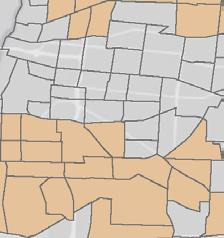








































































SHELBYCARES
1,770 visits
357 total unique patients served
213 screened for obesity, hypertension, and/or diabetes
Source: Tennessee Population Health Consortium
UT HEALTH SCIENCE CENTER HEALTH HUB
2,118 visits
592 total unique patients served
319 screened for obesity, hypertension, and/or diabetes
BOTH LOCATIONS COMBINED
3,888 visits
949 total unique patients served
532 screened for obesity, hypertension, and/or diabetes

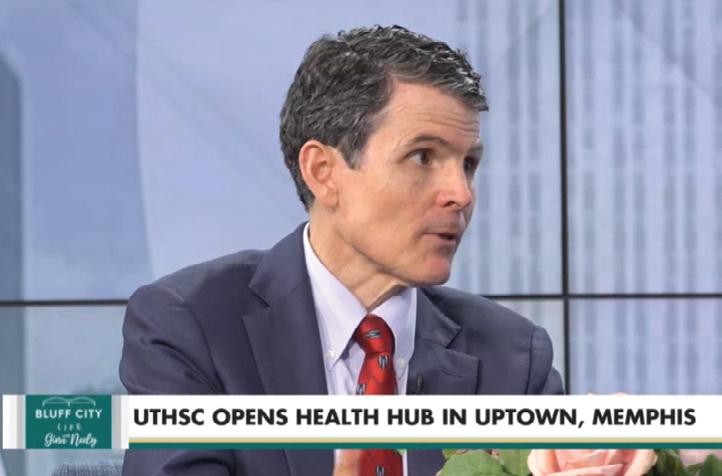
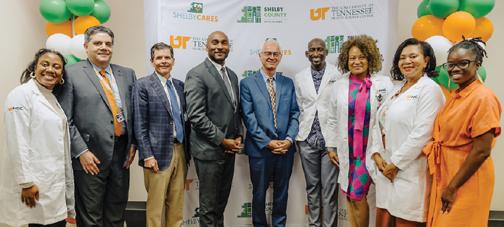

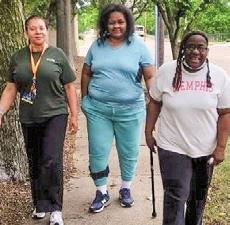

As the UT Health Science Center Neighborhood Health Hubs Program finished its second full year, it expanded to a second location and made substantial progress engaging more neighbors in medically underserved areas, helping them change their lifestyles for better health. This momentum continued as the Consortium and its partners planned a third hub, the UT Health Science Center Health Hub Soulsville, to open in 2024.
ShelbyCares on 3rd, a partnership with Shelby County Mayor Lee Harris, opened in the spring, and by its November celebration had already provided 1,282 coaching visits to over 231 Shelby County residents at high risk for heart disease. While its branding is different and includes additional countysponsored activities, ShelbyCares is operated by The UT Health Science Center using its Neighborhood Health Hub Model and provides the same services as our original UT Health Science Center Health Hub Uptown.
By the end of 2023, the hubs had delivered more than 2,000 health coaching sessions and engaged a total of 1,126 individuals. These numbers are increasing as more individuals from the surrounding neighborhoods learn of the hubs through our community events such as health fairs and through word of mouth from friends and family who have had positive experiences at a hub.
The need for accessible health care in Shelby County is pressing. Over half of adults being overweight or obese,
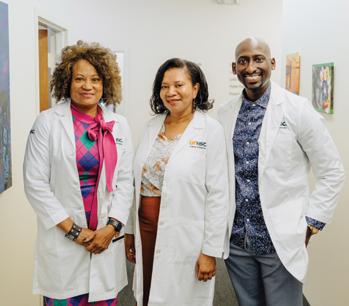
heart disease being the leading cause of death, yet less than 50% of adults in many neighborhoods have seen a primary care physician within the last year. Our Health Hubs are located in these underserved neighborhoods, offering a system of support for weight management, blood pressure control, healthy eating, and improvement in quality of life using a holistic approach. The initiative is a partnership of the Consortium, the UT Health Science Center College of Medicine, and Shelby County.
In addition to screening for obesity, diabetes, and hypertension as well as referring neighbors to physicians, the Health Hubs offer health coaching, so that by working one on one with patients, coaches actively engage and guide people toward their targeted health goals. Both hubs also have a full calendar of free classes, exercise classes as well as regular tobacco cessation, diabetes prevention, diabetes self-management, and popular healthy cooking classes.

The Tennessee Population Health Data Network (TNPOPnet) is designed to help improve care for patients and populations with or at risk for chronic diseases including obesity, diabetes, and hypertension. It holds electronic health information for more than three million Tennesseans and is fully compliant with HIPAA, Office of the National Coordinator for Health Information Technology and Patient-Centered Outcomes Research Institute standards. (Visit uthsc.edu/research/populationhealth/documents/ tn-popnet-data-dictionary-march-2023.pdf for a comprehensive list of recorded data variables.)
The TN-POPnet’s services include tracking and supporting improvements in the quality and outcomes of care for population health initiatives across the state of Tennessee, including the Tennessee Heart Health Network. It further assists the network participants in identifying and promptly attending to high-risk, high-need patients for outreach services. TN-POPnet also enhances telehealth-supported services (e.g., text messaging, and remote patient monitoring). For example, the TN-POPnet data repository can be utilized to deliver secured and tailored motivational text messages, or referral text messages (e.g., referrals to lifestyle change programs such as diabetes self-management) to high-risk patients of the participating health systems and practices. Data made available through the TN-POPnet also can be utilized to conduct population health, quality improvement, health services, and pragmatic clinical research.
An exciting development in 2023 was that TN-POPnet’s capacity was enhanced with TennCare administrative
claims data. As Tennessee’s managed care Medicaid program, TennCare has 1.6 million Tennesseans enrolled, which is approximately 26% of the state’s population. These enrolled individuals are primarily low-income children, pregnant women, older adults, parents or caregiver relatives of minor children, and adults with disabilities or special needs. Because TennCare managed care organization plans cover a wide range of medical care (e.g., healthcare provider or emergency room visits, screening and prevention services, and prescription medications), behavioral services (mental healthcare, addiction treatment), and long-term services and support (nursing home, home healthcare, etc.), their data is a valuable resource for research and other quality improvement initiatives.
The process for accessing TN-POPnet’s data begins with completing a data request form and submitting a brief summary of the research for which it will be used. (Details available at uthsc.edu/research/populationhealth/ data-use.php.) Upon request and application approval, users can similarly access and utilize TennCare’s administrative claims data, either independently, or in combination/merged with other network data. It will be the responsibility of the interested party/researcher to submit and obtain IRB approval from the appropriate institution(s). For more information about the TN-POPnet, including how to join our broad data network of health systems and practices, please visit the Consortium website: uthsc.edu/research/populationhealth/datanetwork.php
Ahuja, N., Mahmood, A., Kedia, S.K., & Dillon P. (2024). Predictors of Opinion toward “R” Rating Policy for Movies with Cigarette Smoking among US Adults. Journal of Health Education & Behavior. doi.org/10.1177/10901981241239933
Alshakhs M, Goedecke T, Bailey JE, Madlock-Brown C. Racial Differences in Healthcare Expenditures for Prevalent Multimorbidity Combinations in the U.S. BMC Medicine, 21, 399 (2023). doi.org/10.1186/s12916-023-03084-2
Butterworth, S., Potempa, S., Laughlin, C., Flaherty-Robb, M., Calarco, M., Harden, K., Schmidt, P., Furspan, P., & Potempa, K. (2023). Case Studies: Person-Centered Health Coaching in People With Negative Social Determinants of Health. AJPM focus, 2(3), 100109. doi.org/10.1016/j.focus.2023.100109
Chen M, Ataga KI, Hankins JS, Zhang M, Gatwood JD, Wan JY, Bailey JE, Age-Related Differences in Risks and Outcomes of 30-Day Readmission in Adults with Sickle Cell Disease, Annals of Hematology, 2023 Sep;102(9):23292342. doi.org/10.1007/s00277-023-05365-5 Epub 2023 Jul 14. PMID: 37450055
Chen M, Goodwin JS, Bailey JE, Bowblis JR, Li S, Xu H. Longitudinal associations of staff shortages and staff levels with health outcomes in nursing homes. Journal of the American Medical Directors Association. Epub. May 29, 2023, doi.org/10.1016/j.jamda.2023.04.017
Chumbler NR, Chen M, Harrison A, Surbhi S. Racial and Socioeconomic Characteristics Associated with the use of Telehealth Services Among Adults With Ambulatory Sensitive Conditions. Health Serv Res Manag Epidemiol. 2023 Mar 3;10:23333928231154334. doi.org/10.1177/23333928231154334 PMID: 36895424; PMCID: PMC9989408.
Gabarda A, Butterworth S, Liang Q, Beckjord E. Pilot Study of a Motivational Interviewing Training on Practitioners’ Skill Set for Patient Centered Communication. American Journal of Health Promotion. 2023;0(0). doi. org/10.1177/08901171231191130
Grant C, Cuddeback JK, Alabi O, Hicks CW, Sadik K, Ciemins EL. Perspectives on Lower Extremity Peripheral Artery Disease: A Qualitative Study of Early Diagnosis and Treatment and the Impact of Health Disparities. Popul Health Manag. 2023 Dec;26(6):387-396. doi.org/10.1089/pop.2023.0095. Epub 2023 Nov 10. PMID: 37948553; PMCID: PMC10698760.
Kedia, S., Mahmood, A., Xie, L., Jiang, Y., Dillon, P., Ahuja, N., ... & Entwistle, C. (2023). Driving under the influence of substances and motor vehicle fatalities among older adults in the United States. Traffic injury prevention, 1-8. doi.org/10.1080/15389588.2023.2188435
Kim, H., Mahmood, A., Chang, C.F. et al. Impact of the Affordable Care Act on participation in the Supplemental Nutrition Assistance Program among low-income older Medicare beneficiaries. BMC Health Serv Res 23, 509 (2023). doi.org/10.1186/s12913-023-09557-7
Mahmood, A., Kedia, S., Dillon, P., Kim H., Arshad, H., & Ray, M. (2023). Food security status and breast cancer screening among women in the United States: Evidence from the Health and Retirement Study and Health Care and Nutrition Study. Cancer Causes & Control. doi.org/10.1007/s10552-023-01667-1
Mahmood, A., Kim, H., Chang, C. F., Kedia, S., Arshad, H., & Dillon, P. J. (2023). mHealth Apps Use and Their Associations with Healthcare Decision-Making and Health Communication Among Informal Caregivers: Evidence from the National Cancer Institute’s Health Information National Trends Survey. American Journal of Health Promotion, 38(1), 40-52. doi.org/10.1177/08901171231202861
Ogunsanmi DO, Harrison AT, Pakker AR, Kovesdy CP, Bailey JE, Surbhi S. Comorbidities and Neighborhood Factors Associated with Prescription of Sodium-Glucose Cotransporter Protein-2 (SGLT-2) Inhibitors and GlucagonLike Peptide-1 (GLP-1) Receptor Agonists among Medically Underserved Populations. Journal of Managed Care and Specialty Pharmacy. 2023 Jun;29(6):699-711. doi.org/10.18553/jmcp.2023.29.6.699
Potempa, K., Calarco, M., Flaherty-Robb, M., Butterworth, S., et al. A randomized trial of a theory-driven model of health coaching for older adults: short-term and sustained outcomes. BMC Prim. Care 24, 205 (2023). doi.org/10.1186/s12875-023-02162-x
Regmi, S., Kedia, SK., Schmidt, M., Mahmood, A., Lugemwa, T., & Dillon PJ. (2023) Methamphetamine-Induced Wakefulness and Sleep Management: A Qualitative Analysis of Online Narratives, Journal of Psychoactive Drugs, doi.org/10.1080/02791072.2023.2246458
Surbhi S, Harris LJ, Box A, Bailey JE, Association of Chronic Opioid Therapy with Emergency Department Visits and Hospitalizations among Super-Utilizers, Journal of Pharmaceutical Health Services Research. Volume 14, Issue 3, September 2023, Pages 276–284. doi.org/10.1093/jphsr/rmad011
Zachary A, Williams JL, Surbhi S, Chen M, Bailey JE Efficacy Studies of Home-based Occupational Therapy Services Following Stroke: A Scoping Review. Occupational Therapy in Health Care. 2023 Jun 10:1-22. doi.org/10.1080/07380577.2023.2221735 PMID: 37300527

An effective health system that invests strategically in primary and preventive care to measurably improve population health and health equity in Tennessee.
To encourage adoption of innovative and evidencebased best practices to transform primary and preventive care, and measurably improve health outcomes, quality of life, and health equity for the people of Tennessee.
To support and strengthen primary care practices across Tennessee to better serve those most in need.
Clinicians, health system leaders, researchers, educators, health coaches, and caregivers determined to help Tennesseans get the essential health care they need most.
The people of Tennessee and those who work to get them essential primary and preventive care.
We give our thanks to the many people and organizations working together to improve the health of Tennesseans:
ADVISORY COUNCIL
Chris Bird, President, Dillard Door & Security; Ed Dismuke, MD, Interim Division Director, Health Systems Management and Policy, University of Memphis School of Public Health; Dawn FitzGerald, Vice President, Federal Operations, Acentra Health; Mike Hanby, Owner, Hanby Auto Concierge; Mason Hawkins, Founder, Southeastern Asset Management; Rick Johnson, President, Coalition for Better Health; Bryan Jordan, Chairman, President and CEO, First Horizon Corporation; Bill Kouns, Co-Founder of Jewelry Television (JTV); Scott Morris, MD, CEO and Founder, Church Health; John Pettey III, MBA, Managing Director, Investments, Raymond James; Ken Robinson, MD, President & CEO, United Way of the Mid-South; Michael Scarbrough, CEO, POGA Companies; Joe Scarlett, Former President and Chairman, Tractor Supply Company; Archie Willis III, Founder and President, ComCap Partners; Tate Wilson, CEO, Kemmons Wilson Family Foundation.
EXECUTIVE COUNCIL
Chair: Shari Rajoo, MD, Vice President and Chief Medical Officer for Population Health Services, Ballad Health. Jenny Barlett-Prescott, MS, Chief Operating Officer, Church Health; Greg Canella, MD, Medical Director, Wellpoint; Cy Huffman, MD, Vice President and Chief Population Health Officer, BlueCare Tennessee; Shantelle Leatherwood, MHA, CEO of Christ Community Health Services; John Leslie, MD, Market Medical Executive, TriSouth Market, Cigna; Matt Odell, BSN, Director of Clinical Quality and Safety, Ascension Medical Group; Kiffany Peggs, MD, Chief Medical Officer, UnitedHealthcare Community & State; Denise Werner, MD, Deputy Medical Director, Family Health and Wellness, Tennessee Department of Health; Nicolette Wise, MPH, Social Determinants of Health Director, TennCare.
ORGANIZATIONAL PARTNERS
uthsc.edu/research/populationhealth/about/partners.php
DATA GOVERNANCE BOARD
uthsc.edu/research/populationhealth/governance.php
To become an Organizational Partner or Member please visit: uthsc.edu/research/populationhealth
Tennessee Population Health Consortium
956 Court Avenue, Suite D228
Memphis, TN 38103-2814
The University of Tennessee is an EEO/AA/Title VI/Title IX/Section 504/ADA/ADEA/V institution in the provision of its education and employment programs and services.
